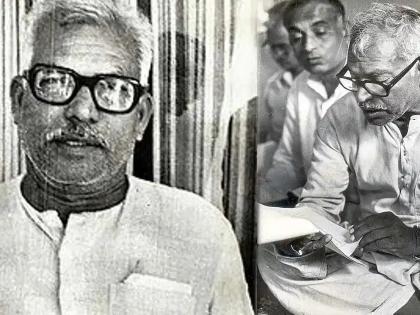Ex-Bihar CM Karpoori Thakur To Be Awarded Bharat Ratna Posthumously
By Lokmat English Desk | Updated: January 23, 2024 20:28 IST2024-01-23T20:28:19+5:302024-01-23T20:28:56+5:30
Karpoori Thakur, the former Chief Minister of Bihar and a stalwart advocate for the rights of backward classes, has ...

Ex-Bihar CM Karpoori Thakur To Be Awarded Bharat Ratna Posthumously
Karpoori Thakur, the former Chief Minister of Bihar and a stalwart advocate for the rights of backward classes, has been posthumously honored with the Bharat Ratna. Thakur, often referred to as Jan Nayak or the People's Hero, left an indelible mark on Indian politics, particularly in Bihar, where he served two non-consecutive terms as Chief Minister.
Born on January 24, 1924, in the Nai caste in Pitaunjhia (now Karpoori Gram) village, Samastipur District, Bihar, Thakur's political journey was deeply influenced by nationalistic ideals. His active involvement in the Quit India Movement as a student activist resulted in a 26-month imprisonment during the Indian independence movement. After independence, he transitioned from teaching to a political career.
As a political figure, Thakur played a pivotal role in various social and political initiatives, focusing on championing the cause of the underprivileged and advocating for land reforms. Serving as a minister, Deputy Chief Minister, and becoming Bihar's first non-Congress socialist Chief Minister in 1970, Thakur's administration enforced total prohibition of alcohol and established numerous educational institutions in Bihar's underserved areas.
Thakur's commitment to social justice was evident in his role as the education minister, where he removed English as a compulsory subject for the matriculation curriculum and actively worked towards implementing reservations for Backward Castes in government jobs.
During the Emergency in India (1975–77), Thakur, along with other Janata Party leaders, spearheaded the "Total Revolution" movement, advocating for the non-violent transformation of Indian society. However, internal tensions within the Janata Party led to his resignation in 1979 over disagreements regarding the reservation policy for Backward Castes.
Undeterred by political challenges, Karpoori Thakur continued his commitment to social justice, serving as the President of the Samyukta Socialist Party. In 1978, he introduced reservations for backward classes in government jobs, leaving an enduring legacy. Thakur's influence extended to mentoring prominent Bihari leaders like Lalu Prasad Yadav, Ram Vilas Paswan, Devendra Prasad Yadav, and Nitish Kumar.
Open in app